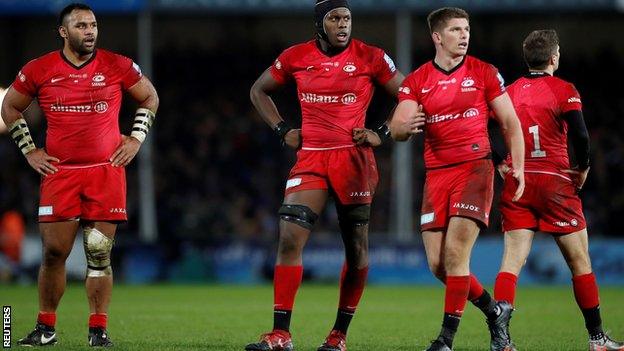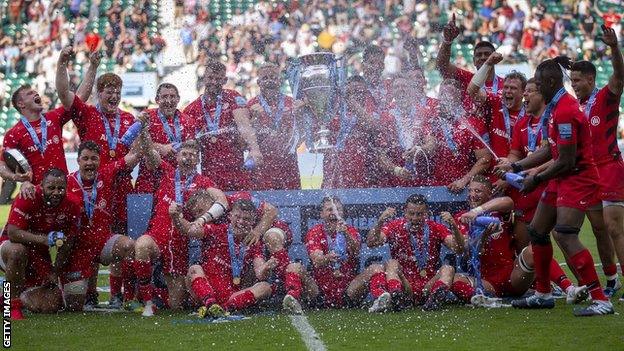Saracens relegation 'is most remarkable scandal in the domestic game'
- Published

Billy Vunipola, Maro Itoje and Owen Farrell were all part of England's team at the 2019 World Cup
Relegations are a familiar and routine part of every sporting landscape. Do not for a moment think Saracens' demotion from English rugby's Premiership has anything to do with that.
This is the most remarkable scandal the domestic game has ever seen.
The dominant team at home and the multiple champions of Europe. A club that has provided more players to England over the past four years than any other. The club that gave England their captain, Owen Farrell. The club that gave England their icon, Maro Itoje. The club that gave England the entire spine of the pack.
It is as momentous to rugby union as it would have been to football had the same happened to the Manchester United of Sir Alex Ferguson.
This is not inadvertent financial mismanagement, which has taken down plenty of great sporting institutions in the helter-skelter dash for glory and its monetary rewards. It is deliberate and clandestine circumvention of the rules, over a significant period of time. It is cheating.
Four Premiership trophies, three Champions Cups. That is a lot of iconic moments, a lot of trophies being hoisted, a lot of laps of honour, garlands and awards, for many rivals to consider forever tainted.
Money in itself guarantees nothing in sport. Saracens still had great players playing at their peak as a relentless unit. They had fine coaching and an ethos that ran through much of the club, from the academy to the Saracens Foundation, that deserves considerable praise. Underpinning it all was a support that would buttress any club.
There have always been flaws and loopholes in the salary cap, a system maybe deliberately set up to sit in the grey area between window-dressing and a genuine attempt to protect clubs from the hubris of their own ambitions.
In the reaction of some others in the game is visible both another form of self-interest - if they suffer, we do better - and a certain unedifying schadenfreude. Success has bred jealousy elsewhere as well as a culture at the top of Saracens that sought to meet each fresh allegation with a new denial.
But without the money some of those players would not be there. Without the chicanery some of the funds to support the more admirable initiatives would be diverted elsewhere.
There will be sympathy for the supporters and sympathy for the players. Those players' futures are now a mess of confusion, of one-season loan deals or a strange sabbatical in the second tier against teams like Ealing, Ampthill and Jersey, and of what all that might mean for their places with England or the British and Irish Lions tour at the end of next season.
It is harder still on the staff who had nothing to do with the subterfuge and took no benefit from the inflated salaries enjoyed by the star players. Pruning at the top mean serious cutbacks lower down.
It is a collapse where almost everyone has lost something profound in the detritus.
Saracens have accepted relegation rather than returning their Premiership trophies for 2018 and 2019 or letting independent auditors at their books. Neither is a pretty look for a club who claimed to represent the best values that rugby has to offer.

Saracens have won four of the past five Premiership titles
The Premiership is weaker as a competition this season, with the impetus of relegation removed from the other clubs, and weaker next term without one of its traditional giants.
The Heineken Champions Cup will be without its dominant side. Sarries supporters who cherished the memories of great victories and away days will now wonder if they hold the same magic they once did.
But what's the alternative? Premiership Rugby has to enforce its own rules. No club can be too big or successful to fall. Someone has to try to keep a grip on the financial side of the elite game.
Every scenario is bad, but the alternative - doing nothing, looking away, accepting a half-hearted apology - is far worse.
And this is where professional rugby union continues to teeter: on a permanent knife-edge, desperate to grow audiences and revenues but with no proven strategy to do so, determined to ape the success of Premier League football but with nowhere near the same clout or means.
Everywhere you look in the game you see financial conundrums and hazardous, long-range punts at trying to solve them.
Private equity group CVC is about to acquire a 27% stake in the company that owns the Pro14, having taken a 27% stake in Premiership Rugby a year ago. It closing in on another deal to buy a £300m stake in the Six Nations.
Private equity firms are not benign entities whose interest is in protecting the traditional structures of the assets they take over. It is about profit, everywhere, at all times.
As one deputy team principal said as CVC's 11-year period owning Formula 1 came to an end: "All their actions have been taken to extract as much money from the sport as possible and put as little in as possible."
At the same time, the value of title sponsorship of both the Six Nations and the Heineken Champions Cup has fallen dramatically in the past two years. World Rugby's big plans to revitalise the international game through their World League proposal also fell apart, when it could not reach its own agreement with CVC.
Meanwhile, Scottish Rugby is paying chief executive Mark Dodson £933,000 this year, despite finishing the last Six Nations with just one win and going out of the World Cup at the group stage.
Punts and speculation and mistakes. Some 25 years on from the slow death of the old amateur structures, it is as uncertain a future as ever.
Big teams do return from catastrophe. Rangers are challenging Celtic again at the top of the Scottish Premiership, eight years after being demoted to the fourth tier. Juventus were stripped of one league title and relegated to Serie B after the Calciopoli scandal of 2006, but were back in the top flight a year later.
Saracens will be back even if, like Juve, many of their superstars will end up elsewhere. So too will the wider financial conditions which persuaded them to chance their arm in the first place.
The sums in professional rugby union too often do not add up. And no-one can agree on how they should.
